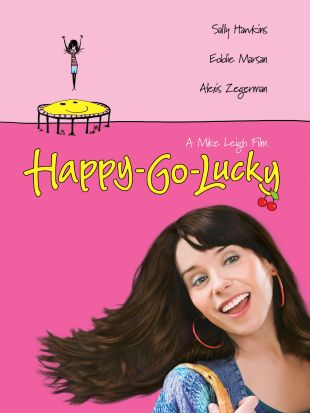
Happy-Go-Lucky represents yet another installment in Mike Leigh's ongoing canon of odes to working-class Britons leading quiet lives of desperation. The main character, Poppy (the extraordinary Sally Hawkins), is a charming and charismatic 30-year-old schoolteacher who operates according to a single principle: confront the ills of the world with bubbly exuberance and a series of lighthearted jests. The narrative arc brings Poppy to a moment of life-changing disillusionment -- not the shattering disillusionment that will send the young woman tumbling down into a mire of cynical pessimism, but the sort that will impart her with a tad more wisdom than she initially demonstrated. Many viewers will feel distanced from Poppy at first glance; her laugh-it-off attitude feels both extremely grating and pitifully naïve. Leigh spends much of the movie dispelling our misperceptions about this most unusual young woman. One might be inclined, for instance, to read her free-spiritedness as indicative of a lack of intelligence; however, Poppy, as it turns out, excels at her difficult full-time teaching job. And one might, for example, be inclined to read her proclivity for turning everything into a joke as insensitivity to others around her. But nothing could be further from the truth -- we witness her sudden gravity in the face of a little boy beating up others in her classroom, and marvel at the gentility and compassion with which she handles it. We begin to realize, over the arc of the narrative, that the up-front exterior qualities are in fact coping devices; one wouldn't be surprised to learn that the thick-skinned Poppy may have encountered severe domestic hardships early on in life and admirably learned how to contend with them. In the film's most telling scene, she gazes out the window and declares, "Look at that beautiful sky." Leigh then cuts to a shot of a blue sky suddenly threatened by menacing clouds. It's doubtful that the writer-director could have devised a more telling visual metaphor for Poppy's perception of the world. Poppy wins the audience over with two heart-rending scenes so intransigent and finely felt that the emotions grow palpable. One involves the troubled student, whom Poppy speaks to with the assistance of a kindly social worker, and another involves a homeless derelict whom Poppy befriends one night while walking home. She speaks to the man not patronizingly, but completely on the level -- and as she does, Leigh cuts to a close-up of the man's face, as grateful tears well up in his eyes. The character of Poppy, like the writer-director, exudes humanism, and Leigh wants to show us that such humanism indeed has merit -- that it would help if we were all a little bit more compassionate and vulnerable to one another.
The director wants to reveal the limits of this humanism as well, and to this end, he relies on the beleaguered relationship between Poppy and her driving instructor, Scott (Eddie Marsan). The latter is really some piece of work -- he's an angry, irascible misogynist who has apparently gravitated to Satanism as a way of life. He repeatedly screams, "En-Ra-Ha, En-Ra-Ha, En-Ra-Ha," at her during their lessons and orders her to "focus on the eye at the top of the pyramid!" Between this and his nearly unintelligible exhortations about an angel expelled from Heaven prior to Lucifer, one gains a window into Scott's twisted psychosis, and his reliance on the occult as an emotional anchor. We can see early on that he isn't buying any of Poppy's attempts to mollify his anger, and indeed, that her efforts in his direction are not merely wasted but seriously counterproductive. The picture benefits enormously from Marsan's performance; he pulls us into Scott, making us feel the poor man's inner rage, turmoil, and deep-seated confusion, to such a degree that he nearly out-acts Hawkins. Leigh's genius, as always, lies in constructing a loose, semi-improvised narrative with innumerable scenes that fail to drive the narrative forward, but offer us glistening behavioral and psychological insights into his characters that we would almost certainly miss in more tightly scripted films. The picture as a whole benefits not merely from the excellent performances, but from its warm emotional core and its infectious love of people, topped off by a mature (though not jaded) sobriety about human limitations that thoroughly validates everything preceding it.
